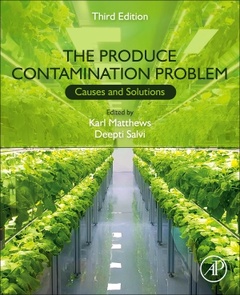The Produce Contamination Problem (3rd Ed.) Causes and Solutions Food Science and Technology Series
Langue : Anglais
Coordonnateurs : Matthews Karl, Salvi Deepti

The Produce Contamination Problem: Causes and Solutions, Third Edition is a fully revised resource on preventative controls at all stages of handling, including the use of new technologies for the inactivation of pathogens in both water and commodity. The book begins with an analysis of the contamination problem to identify novel research designed to understand the interaction of human pathogens. Outbreak characteristics vulnerable to contamination are discussed, along with global issues surrounding production. This new edition includes updates on regulatory issues and the newest advances in technologies for the detection of pathogens, whole genome sequencing, and utility in test and hold programs.
Part 1: Produce Contamination: Scope and Sources
1. Scope of the Produce Contamination Problem
2. Microbial Attachment and Limitations of Decontamination Methods
3. Identification of the Source of Contamination
4. Manure Management
5. Water Quality
6. Environmental Contamination: Indoor Farming Operations
Part 2: Commodities Associated with Major Outbreaks and Recalls
7. Leafy Vegetables
8. Melons
9. Seed Sprouts
10. Tomatoes and Cucumbers
11. Produce and Viruses: What's the Problem
Part 3: Contamination Avoidance Pre and Postharvest
12. Produce Contamination Issues in Mexico and Central America
13. Produce Safety in Thailand
14. Vertical Farming
Part 4: Technology for Reduction of Human Pathogens in Fresh Produce
15. Disinfection of Produce with Conventional and Novel Washing and Sanitizing Technology
16. Advanced Technologies for Detection and Identification of Pathogens
17. Advances in Equipment and Processing
18. Conclusions and Recommendations
1. Scope of the Produce Contamination Problem
2. Microbial Attachment and Limitations of Decontamination Methods
3. Identification of the Source of Contamination
4. Manure Management
5. Water Quality
6. Environmental Contamination: Indoor Farming Operations
Part 2: Commodities Associated with Major Outbreaks and Recalls
7. Leafy Vegetables
8. Melons
9. Seed Sprouts
10. Tomatoes and Cucumbers
11. Produce and Viruses: What's the Problem
Part 3: Contamination Avoidance Pre and Postharvest
12. Produce Contamination Issues in Mexico and Central America
13. Produce Safety in Thailand
14. Vertical Farming
Part 4: Technology for Reduction of Human Pathogens in Fresh Produce
15. Disinfection of Produce with Conventional and Novel Washing and Sanitizing Technology
16. Advanced Technologies for Detection and Identification of Pathogens
17. Advances in Equipment and Processing
18. Conclusions and Recommendations
Karl R. Matthews teaches graduate courses in Microbial Food Safety and Food Biology Fundamentals. He has received several awards, including: Lifetime Achievement Award in Phyllosphere Biology, Amity University; Outstanding service – Online Mentor Award, American Society for Microbiology and Endel Karmas Award for Excellence in Teaching. He’s been an editorial board member on several journals and is currently the Editor of the Journal of Food Safety, a position he has occupied since 2004.
Deepti Salvi's research involves numerical modeling of attachment and detachment of bacteria to and from produce surface during fresh produce washing to minimize cross-contamination. She is also leading research in the applications of non-thermal technologies, such as cold atmospheric plasma, plasma activated water, high pressure processing, and UV for microbial inactivation.
Deepti Salvi's research involves numerical modeling of attachment and detachment of bacteria to and from produce surface during fresh produce washing to minimize cross-contamination. She is also leading research in the applications of non-thermal technologies, such as cold atmospheric plasma, plasma activated water, high pressure processing, and UV for microbial inactivation.
- Includes new information on sustainable production practices, including aero-farming
- Presents information on preventative controls at all stages of food handling
- Provides information on the use of the latest technologies for the inactivation of pathogens in water, and on commodities
Date de parution : 06-2023
Ouvrage de 412 p.
19x23.4 cm
Thème de The Produce Contamination Problem :
© 2024 LAVOISIER S.A.S.



